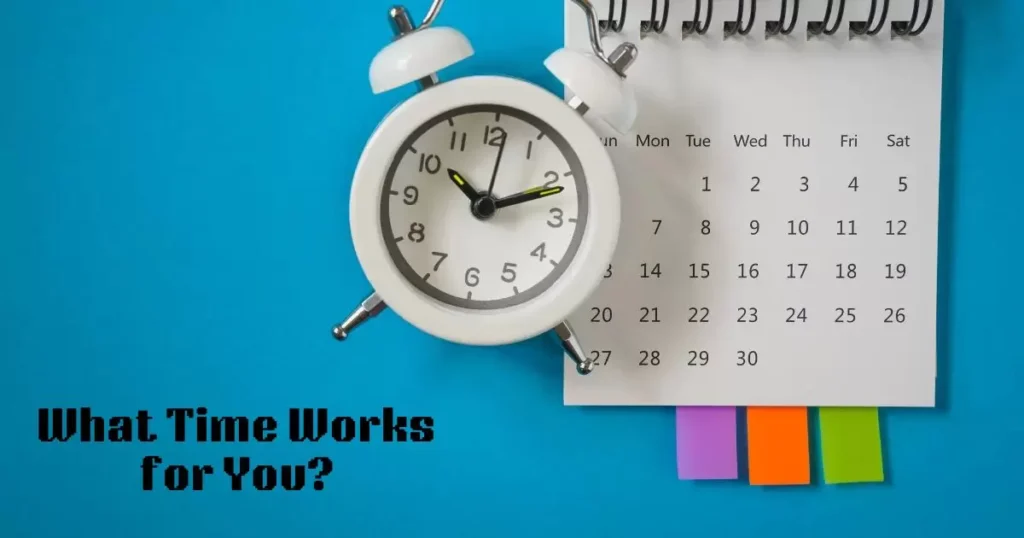When you need to check someone’s availability, varying your language can make your request sound more engaging or professional.
Here are several alternative ways to ask “Would you be available?” with scenarios, examples, and explanations to help you communicate more effectively.
1. Are You Free?
Scenario: You are scheduling a casual meeting with a colleague.
Example 1: “Are you free this afternoon to discuss the project?” Example 2: “Are you free tomorrow morning for a quick call?”
Explanation: This informal phrase is suitable for less formal settings and casual inquiries about availability.
2. Can We Schedule a Time to Meet?
Scenario: You are setting up a formal meeting with a client.
Example 1: “Can we schedule a time to meet next week to go over the details?” Example 2: “Can we schedule a time to meet and discuss your feedback?”
Explanation: This phrase is appropriate for professional contexts where you need to arrange a specific time.
3. When Would Be a Good Time for You?
Scenario: You are arranging a meeting and want to accommodate the other person’s schedule.
Example 1: “When would be a good time for you to have a meeting this week?” Example 2: “When would be a good time for you to discuss the upcoming event?”
Explanation: This phrase seeks to find a time that works well for the other person, showing flexibility.
4. Are You Available to Meet?
Scenario: You need to check availability for a project discussion.
Example 1: “Are you available to meet and review the latest project updates?” Example 2: “Are you available to meet next Tuesday for a planning session?”
Explanation: This phrase is straightforward and suitable for both formal and informal contexts.
5. What Time Works for You?

Scenario: You are coordinating a time for a conference call.
Example 1: “What time works for you to join the conference call?” Example 2: “What time works for you to finalize the report?”
Explanation: This phrase focuses on finding a mutually convenient time for the other person.
6. Could We Find a Time That Suits You?
Scenario: You are setting up a meeting with a busy executive.
Example 1: “Could we find a time that suits you to discuss the proposal?” Example 2: “Could we find a time that suits you for a brief consultation?”
Explanation: This phrase is polite and shows consideration for the other person’s schedule.
7. Do You Have Some Time to Spare?
Scenario: You are asking for time to discuss a new idea.
Example 1: “Do you have some time to spare this week to discuss the new initiative?” Example 2: “Do you have some time to spare for a quick meeting about the project?”
Explanation: This phrase is casual and implies that the time needed is flexible.
8. Is There a Convenient Time for You?
Scenario: You are arranging a time to review a report.
Example 1: “Is there a convenient time for you to go over the report?” Example 2: “Is there a convenient time for you to meet and discuss the findings?”
Explanation: This phrase is polite and focuses on finding a time that is easy for the other person.
9. What Time Are You Available?
Scenario: You need to arrange a call with a team member.
Example 1: “What time are you available to discuss the upcoming project?” Example 2: “What time are you available for a call to review the proposal?”
Explanation: This phrase directly asks for the available time slots, making it straightforward.
10. Could We Arrange a Time That Works for You?
Scenario: You are scheduling a meeting with a potential client.
Example 1: “Could we arrange a time that works for you to discuss the partnership?” Example 2: “Could we arrange a time that works for you to review the contract?”
Explanation: This phrase emphasizes finding a suitable time for the other person.
11. Are You Open to Meeting?
Scenario: You are checking availability for a collaboration.
Example 1: “Are you open to meeting next week to talk about the collaboration?” Example 2: “Are you open to meeting to discuss the new project?”
Explanation: This phrase is polite and inquires about the person’s willingness and availability.
Other Ways to Say “Pay for Your Own Meal”
12. When Can We Connect?
Scenario: You are trying to find a time to discuss an urgent matter.
Example 1: “When can we connect to go over the urgent updates?” Example 2: “When can we connect to finalize the details of the event?”
Explanation: This phrase is suitable for situations where timely communication is needed.
13. Are You Up for a Meeting?
Scenario: You are proposing a meeting to review a proposal.
Example 1: “Are you up for a meeting to discuss the proposal?” Example 2: “Are you up for a quick chat about the upcoming changes?”
Explanation: This informal phrase is appropriate for a more relaxed approach to scheduling.
14. What’s Your Availability Like?
Scenario: You need to coordinate a time for a team discussion.
Example 1: “What’s your availability like for a team meeting next week?” Example 2: “What’s your availability like to review the project status?”
Explanation: This phrase seeks to understand the person’s general availability.
15. Can We Set Up a Time to Talk?
Scenario: You are arranging a call to discuss a new opportunity.
Example 1: “Can we set up a time to talk about the new opportunity?” Example 2: “Can we set up a time to talk and finalize the details?”
Explanation: This phrase is suitable for both formal and informal settings, focusing on setting up a conversation.
16. Is There a Good Time for Us to Meet?
Scenario: You are coordinating a meeting with multiple participants.
Example 1: “Is there a good time for us to meet and review the proposal?” Example 2: “Is there a good time for us to meet and discuss the project updates?”
Explanation: This phrase seeks a suitable time for all parties involved.
17. When Are You Free?
Scenario: You are checking availability for a one-on-one meeting.
Example 1: “When are you free to discuss the upcoming project?” Example 2: “When are you free for a quick chat about the event details?”
Explanation: This informal phrase is suitable for checking availability in a relaxed manner.
18. Can We Find a Time That Works for Both of Us?
Scenario: You are trying to schedule a meeting with a colleague from another department.
Example 1: “Can we find a time that works for both of us to review the budget?” Example 2: “Can we find a time that works for both of us to discuss the new strategy?”
Explanation: This phrase emphasizes collaboration and finding a mutually convenient time.
19. Are You Available to Connect?
Scenario: You are reaching out to discuss potential collaboration.
Example 1: “Are you available to connect this week to talk about the partnership?” Example 2: “Are you available to connect and discuss the project details?”
Explanation: This phrase is suitable for both formal and informal contexts.
20. When Can We Schedule a Discussion?
Scenario: You need to arrange a time to review a proposal with a client.
Example 1: “When can we schedule a discussion about the proposal?” Example 2: “When can we schedule a discussion to go over the project updates?”
Explanation: This phrase is direct and suitable for formal scheduling.
21. What Time Works Best for You?
Scenario: You are finding a time for a project review meeting.
Example 1: “What time works best for you to have a project review?” Example 2: “What time works best for you to meet and discuss the progress?”
Explanation: This phrase focuses on finding the most convenient time for the other person.
22. Could We Arrange a Convenient Time?
Scenario: You are setting up a call with a busy executive.
Example 1: “Could we arrange a convenient time to discuss the new initiative?” Example 2: “Could we arrange a convenient time for a brief consultation?”
Explanation: This phrase is formal and considerate, emphasizing convenience.
23. Are You Able to Meet?
Scenario: You are checking the availability of a team member for a review session.
Example 1: “Are you able to meet to discuss the upcoming deadline?” Example 2: “Are you able to meet and provide your feedback on the draft?”
Explanation: This phrase is straightforward and suitable for both formal and informal contexts.
24. Can We Arrange a Meeting Time?
Scenario: You need to schedule a meeting with a potential client.
Example 1: “Can we arrange a meeting time to discuss the proposal?” Example 2: “Can we arrange a meeting time to review the contract details?”
Explanation: This phrase focuses on setting up a specific time for a meeting.
25. Do You Have Availability?
Scenario: You are inquiring about someone’s schedule for a project discussion.
Example 1: “Do you have availability this week to talk about the project?” Example 2: “Do you have availability for a quick check-in regarding the proposal?”
Explanation: This phrase is a formal way to ask about someone’s schedule.
26. When Can We Find Time to Meet?
Scenario: You are trying to coordinate a meeting with multiple participants.
Example 1: “When can we find time to meet and discuss the upcoming event?” Example 2: “When can we find time to meet and go over the new strategy?”
Explanation: This phrase emphasizes the need to find a suitable time for everyone involved.
27. Are You Up for a Meeting?
Scenario: You are suggesting a meeting to review project milestones.
Example 1: “Are you up for a meeting to review the project’s progress?” Example 2: “Are you up for a quick discussion about the upcoming tasks?”
Explanation: This informal phrase is suitable for a casual or relaxed approach to scheduling.
28. What Times Are You Available?
Scenario: You are trying to schedule a call with a busy client.
Example 1: “What times are you available for a call this week?” Example 2: “What times are you available to discuss the project details?”
Explanation: This phrase seeks specific time slots that work for the other person.
29. Can We Coordinate a Time to Meet?

Scenario: You are coordinating with a colleague from a different time zone.
Example 1: “Can we coordinate a time to meet that fits both our schedules?” Example 2: “Can we coordinate a time to discuss the proposal considering our time differences?”
Explanation: This phrase is useful for dealing with time zone differences and scheduling conflicts.
30. Is There a Time That Works for You?
Scenario: You are scheduling a meeting with a stakeholder.
Example 1: “Is there a time that works for you to review the project?” Example 2: “Is there a time that works for you to discuss the new plans?”
Explanation: This phrase is flexible and focuses on accommodating the other person’s schedule.
Conclusion
Exploring alternative ways to ask “Would you be available?” can enhance your communication and make scheduling more efficient.
Whether you need a formal or informal approach, these variations help tailor your request to different contexts and preferences. Choose the phrase that best fits your situation to ensure clear and effective communication.

Hi! I’m Lauren Reynolds, the author of Grammar Glides. I create easy-to-follow content that helps you master English with confidence. Let’s make learning English simple and enjoyable together!

